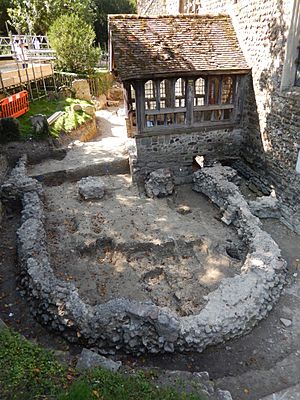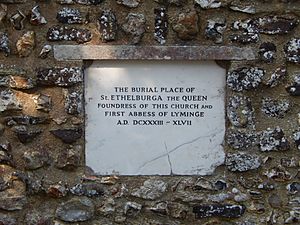Æthelburh of Kent facts for kids
Quick facts for kids Saint Æthelburh |
|
|---|---|
| Queen of Northumbria, Abbess of Lyminge |
|
| Born | c. 601 Kent, England |
| Died | c. 647 Lyminge, Kent, England |
| Venerated in | Roman Catholic Church Eastern Orthodox Church Anglican Communion |
| Major shrine | Collegiate Church at Canterbury, England |
| Feast | 5 April |
Æthelburh of Kent (born around 601) was an important Anglo-Saxon queen. She was also known as Tate or Tata. Æthelburh was the queen of Northumbria and the second wife of King Edwin. Her marriage was very important because it helped bring Christianity to the northern parts of England.
Contents
A Royal Beginning
Æthelburh was born in the early 600s. Her parents were King Æthelberht and Queen Bertha of Kent. Her brother was Eadbald.
In 625, Æthelburh married King Edwin of Northumbria. A key part of their marriage agreement was that Edwin would become a Christian. He also agreed to let Paulinus, a bishop, come to Northumbria. Paulinus's job was to help convert the people there to Christianity.
Æthelburh's Children
Æthelburh and King Edwin had several children together. Their children were Eanflæd, Ethelhun, Wuscfrea, and Edwen.
After King Edwin passed away, Æthelburh made sure her daughter Eanflæd was safe. Eanflæd grew up under the care of her uncle, King Eadbald of Kent. Æthelburh also sent her sons to live with King Dagobert I. She wanted to keep them safe and sound.
Spreading Christianity
King Edwin became a Christian because of his marriage to Æthelburh. She brought her bishop, Paulinus, with her to Northumbria. Both Æthelburh and her mother, Bertha, received letters from important church leaders. These letters encouraged them to help their husbands become Christians.
Their daughter, Eanflæd, was one of the first people to be baptized in Northumbria. This means she was officially welcomed into the Christian faith.
A Royal Baptism
One time, King Edwin was hurt. This made Æthelburh very worried, and she went into labor early. Both the queen and her new baby seemed to be in danger. Bishop Paulinus prayed for them. After they both got better, King Edwin agreed to something special. He asked that 12 people from his royal household, along with the baby, be baptized.
Founding a Monastery
After King Edwin died in battle in 633, Æthelburh returned to Kent. There, she started one of the first Benedictine nunneries in England. A nunnery is a place where nuns live and pray. This special place was at Lyminge, near Folkestone.
Æthelburh led this nunnery until she passed away in 647. Her remains were later honored there.
Modern studies show that the buildings at Lyminge were made for both monks and nuns. The church was built using stones from old Roman buildings. This was a common practice for Anglo-Saxons. It might have even been built from parts of a Roman villa or a large public building.
 | Lonnie Johnson |
 | Granville Woods |
 | Lewis Howard Latimer |
 | James West |



